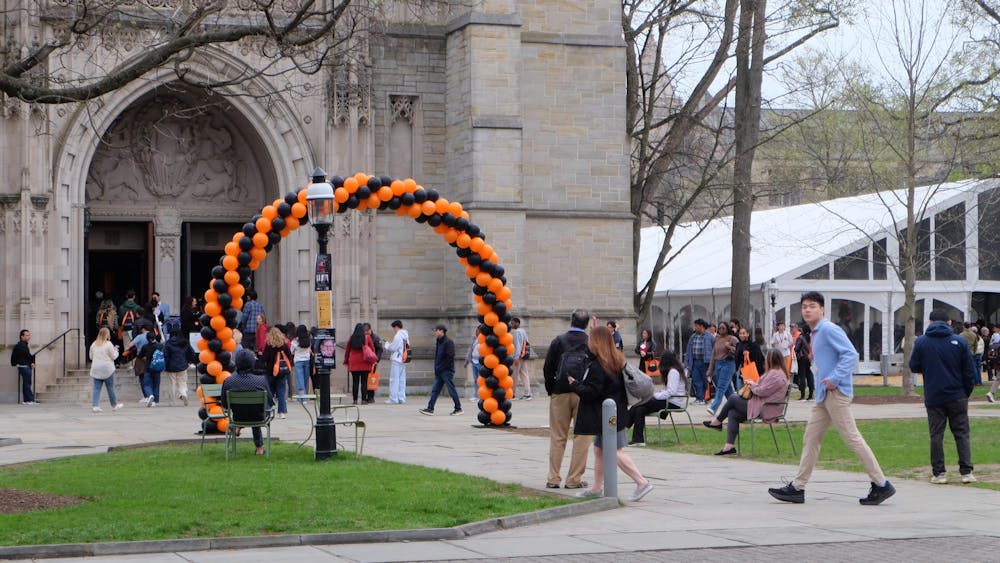Hundreds of prospective students have descended upon Princeton’s campus over the last two weekends for Princeton Preview 2025. Distinguishable by their orange drawstring bags and name tags, many attendees had already committed to the Class of 2029, as indicated by a small paw print sticker on their name tags, while others arrived with their decisions still unmade.
Each year, recent admits are invited to the one-day event to “attend programs and discussions about studying at Princeton, meet current students and faculty members, and learn about [Princeton’s] close-knit residential community.” Students are encouraged to bring a guest to participate in the Preview programming, and are served breakfast and lunch.
Uncommitted students shared the factors they are taking into consideration before making a decision. “I really value fit, community, and the overall campus,” said Sophie Sarazin, a prospective student from Pensacola, Fla.
Choosing a college can be difficult, and for Princeton admits, this was no exception, especially with uncertainty in the current state of higher education. Several students cited federal funding cuts and pauses as potential concerns about committing to Princeton.
“[Funding] definitely is a factor, considering that it is a research institution,” Sarazin said. “I do appreciate the University’s stance on accommodating the students.”
Other prospective students echoed similar concerns. Alisha Owaise, another uncommitted attendee, stated that she planned to “do a little bit more research before committing to see if [the federal funding cuts] will have a bigger impact” on her experiences at Princeton. Regardless, Owaise said that she was leaning toward Princeton based on her Preview experience.
However, the majority of interviewed students, both committed and uncommitted, shared that the funding reductions were not a significant factor in their decision-making processes.
Param Thakkar, an uncommitted attendee, described how he plans to focus on the “vibe and whether [he’ll] be able to thrive in the community” when making his decision. Furthermore, he plans on “taking a look at the opportunities for what will happen after [he] graduate[s].”

When asked about the extent to which federal funding issues are affecting his decision, he replied, “To be honest, not at all — just because it’s affecting every single institution the same.”
“In one of the [Preview] sessions that we had, the admissions staff were saying how they are really committed to undergrad financial aid and how this funding [pause] is mainly impacting graduate students,” said Betty Nguyen, another uncommitted student.
“As of now, it’s not really impacting undergraduate students, so it’s not really impacting my decision to choose Princeton,” she continued.
A University budget plan approved in early April projected a small increase in the budgets for undergraduate financial aid, as well as graduate student support. University President Christopher Eisgruber ’83 also recently joined over 250 college presidents in signing a letter against the “unprecedented government overreach and political interference” in higher education.

Among the committed students, enthusiasm remained high and largely untouched by the funding conversation. “I committed right after I got in,” said committed student Mia Jackson ’29. “Princeton has always been my dream school,” Jackson added.
Other students discussed the attractiveness of Princeton’s specialized programs. “I was really drawn to all of the opportunities that are given to the School of Public and International Affairs (SPIA) students,” commented Bella Raichelson ’29, who committed to Princeton during the Restrictive Early Action (REA) round.
Prospective students planning on majoring in STEM likewise shared their enthusiasm, especially regarding opportunities for simultaneously studying both engineering and the humanities. “[I] applied because of the Mechanical and Aerospace Engineering degree,” said Mira Schubert ’29, who is also planning on minoring in creative writing.
“What drew my eye to Princeton over other schools was the diversity of courses that I could take,” Christian Martinez ’29, another committed student, said. “I’m very interested in biology and conservation, and I like that I am able to take other courses that I have a little interest in and spread out what I’m trying to learn.”
Furthermore, committed students also identified Princeton’s generous financial aid as a strong factor in their decision-making process. “The financial aid here is amazing — they’ve really helped me through it [the commitment stage],” said John Boctor ’29, who committed to Princeton two weeks ago.
Admitted students have until May 1 to notify Princeton about their decision to matriculate.
Isaac Bernstein is a staff News writer for the ‘Prince.’ From Pittsburgh, Penn., he most commonly covers new academic departments and majors, progressions in faculty research and pursuits, and the most recent happenings of Princeton's alumni.
Please send any corrections to corrections[at]dailyprincetonian.com.








